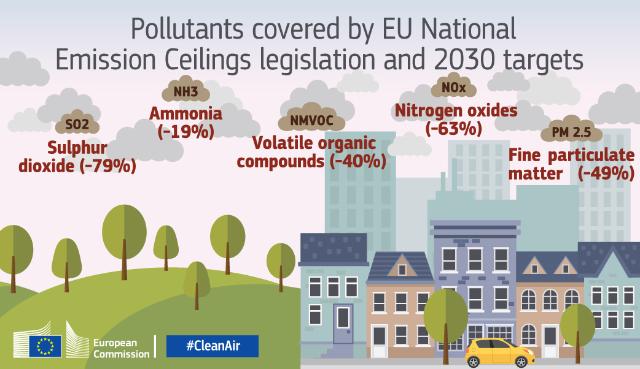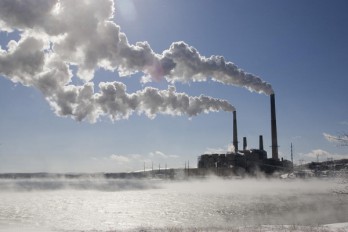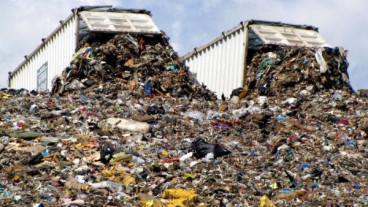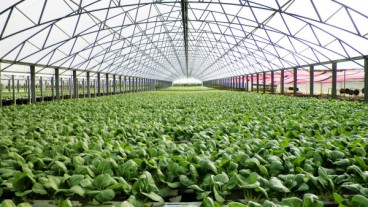Stricter new limits approved by the EU to drastically cut air pollution

The new directive will enter into force on 31 December 2016
The new directive will enter into force on 31 December 2016
A new directive was approved on 14 December 2016 by the European Parliament and the Council, setting stricter limits on the five main pollutants in Europe (PM2.5, SO2, NOx, NMVOC, NH3). The new National Emissions Ceilings (NEC) Directive, based on a Commission proposal, will enter into force on 31 December 2016 and Member States must transpose it into national legislation by 30 June 2018. When fully implemented, it will cut the negative health impacts of air pollution -such as respiratory diseases and premature death- to half by 2030. Member States should produce a National Air Pollution Control Programme by 2019, setting out measures to ensure that emissions of the five main air pollutants are reduced by the percentages agreed by 2020 and 2030. They must also implement the measures in fields such as transport, agriculture, energy and climate. This will require investments, but the Commission will facilitate access to EU funding instruments, and of course the costs will be many times outweighed by the benefits in cost savings, particularly on health care and sickness at work. The Commission will work with Member States to ensure sound implementation, for example by setting up a new Clean Air Forum by autumn 2017.
The NEC Directive sets maximum emission ceilings for each country per year for the five main pollutants. And although the 2020 reduction commitments are identical to those the Member States already agreed upon in the 2012 revision of the Gothenburg Protocol, those for 2030 require substantially deeper reductions. More specifically, until 2030, the following targets should be met: fine particulate matter (PM2.5) -49%, sulphur dioxide -79%, nitrogen oxides -63%, non-methane volatile organic compounds -40% and ammonia -19%.
The benefits
The agreement on stricter limits in the NEC is an important achievement in the fight against an invisible killer such as air pollution. The measures will be beneficial not only for the European citizens’ health, but also for the quality of fresh water, soil and ecosystems. ‘Air pollution kills over 450,000 people in Europe each year. This is more than ten times as many as road traffic accidents. Now it is for the national governments to start with implementation so that people can benefit from cleaner air. We will work with Member States to support them in this challenge for improving the health of EU citizens’, said Karmenu Vella, Commissioner for the Environment, Fisheries and Maritime Affairs.
Source: European Commission

Source: European Commission
Want to read more like this story?

What the new ‘Air Quality Atlas for Europe’ reveals
Feb, 05, 2018 | NewsThe sources and levels of air pollution in Europe have been mapped The sources and levels of air po...

This artificial tree captures air pollutants 275 times more efficiently than a normal one
Aug, 10, 2017 | NewsIt was developed by a German start-up in order to fight air pollution It was developed by a German...

Indoor pollution: a widely overlooked problem
May, 10, 2016 | NewsScientists propose the use of real-time sensors of indoor air-quality for the battle against the Sic...

China is winning the fight against air pollution
Mar, 30, 2018 | NewsIf the trend continues, the average Chinese citizen will see their life expectancy increase by 2.4 y...

Sweeping Floods In China Due To Air Pollution!
Jul, 13, 2015 | NewsThe black veil of air pollution in the industrial valley of Sichuan seems that have played a key rol...

Google Street View cars used for high-resolution air pollution mapping
Jun, 12, 2017 | NewsThis new approach towards urban air pollution mapping offers much greater spatial precision in compa...

Coal-burning in the Balkans is responsible for 8.5 billion € in health costs per year
Mar, 23, 2016 | NewsThe myth that coal is the cheapest form of energy is debunked The myth that coal is the cheapest...

Champ Landfill will pay $1.6 million to improve air quality, after settlement with EPA
Sep, 13, 2016 | NewsThe measures to be taken are designed to minimize odors and air emissions from the landfill The m...

New EU legislation on waste management
Jun, 08, 2018 | NewsBased on the principles of circular economy, the new guidelines aim for a drastic reduction of landf...
Trending

Taipei 101’s impressive tuned mass damper

Characteristics of Load Bearing Masonry Construction

The Billion-Dollar Airport Boom: 2025 Megaprojects Shaping the Skies

China Completes World’s Longest Expressway Tunnel, Redefining Connectivity

Dutch greenhouses have revolutionized modern farming



